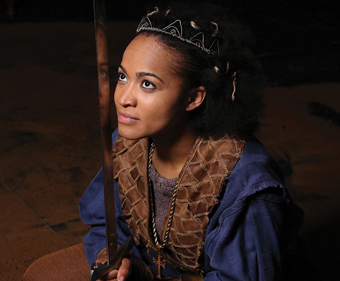
Some roles in Shakespeare—creatures from the world of Fancy, in particular—have a long record of exemption from binary restrictions on gender-linked infrastructure. Puck and Ariel, for example, despite being addressed as "he" and "him" in the text, have customarily been played by women, while Titania's fairy entourage typically boasts courtiers representing a wide spectrum of secondary sexual characteristics. (Caliban, significantly, continues to be almost exclusively portrayed by men.)
The Babes With Blades (along with its predecessor, Footsteps Theatre), have been staging all-female Shakespeare since 1990, but not until the legendary Glenda Jackson essayed the role of King Lear at England's Old Vic Theatre in 2016 was gender-blind casting in classical repertoire elevated from a niche-audience novelty to an artistic goal in support of egalitarian progress.
This manifesto is evidenced in not one, but two, upcoming productions of the history play, Henry V, both of them featuring female actors in the title role: this summer, First Folio Theatre's final production before a two-year hiatus for repairs on its outdoor facility will star Diana Coates as the triumphant hero of Agincourt, while in 2020, Brenda Barrie will play the young warrior-king for The House Theatre of Chicago.
Where do these innovations spring from? "I directed Diana in an all-female Henry for the Babes With Blades in 2017," First Folio director Hayley Rice admits, "My father (who also just happens to be First Folio's producer) saw it and immediately asked both of us if we would be interested in doing the show again, this time on a BIG STAGE surrounded by a HUGE GRASSY LAWN to facilitate the inevitable blurring of the fourth wall that occurs in outdoor theater. Of course, we said yes right away."
Nathan Allen, artistic/production director for The House Theatre of Chicago, emphasizes the importance, before proceeding, of making sure you have a capable actor. "Did you know that [Brenda] plays Wonder Woman in the Mortal Combat video games?" he exults, "We were talking about Shakespeare, and brainstorming ideas for projects that would challenge our company. We decided to do Henry V because it was the scariest idea suggested, and since I'd follow Brenda off a cliff, it was only natural to imagine her playing Henry."
A unisex visual panorama can assist an audience in suspending their disbelief, thus enabling them to see only the characters, to the exclusion of the actors. Both the proposed productions will employ a mixed-gender cast, however. Do their directors anticipate this causing difficulties?
"I learned, a long time ago, not to guess at how an audience will respond to a show." shrugs Rice, "What I have noticed, though, is that 'non-traditional casting'—a term I don't like, by the way—by not affirming playgoers' preconceived ideas of who should play what part, often jolts them out of their assumptions, so that they can see the play in a new way, whether they are conscious of it or not."
Allen concurs, "Part of our company's design mission is to strive for universal representation of gods, monsters and heroes. We want to allow the greatest diversity of people to see themselves in these mythic figures."
Why Henry, though? Why not Hamlet, or Mercutio, or Prince Hal? Is there something inherently non-binary about Henry Monmouth?
"Certainly not!" insists Rice, "I think Henry's personality is steeped in cis white male privilege! That's precisely why you need an actor who's lived outside of that experience—so that they can shine a fresh light on the story, and the character, that we all thought we knew."
Henry V (First Folio Theatre) plays at the Mayslake Peabody Estate in Oak Brook from July 10-August 18.
Henry V (The House Theater of Chicago) plays at the Chopin from March 26-May 17 2020
Mary Shen Barnidge
Contributing Writer

 Follow Us On Twitter
Follow Us On Twitter